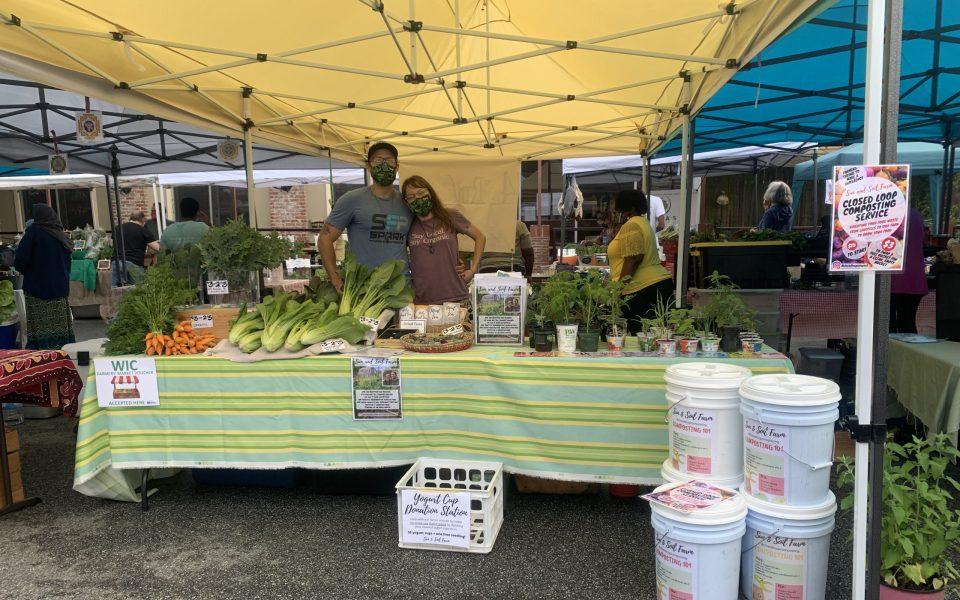Brittany Peters and Richard Raggi want your trash. Most of it, anyway.
The two are the owners of Sun and Soil Farm based out of Madison, a four-acre homestead where they grow veggies, raise chickens, make tea blends and harvest berries. But lately they’ve ventured into a new realm of business: composting.
Composting services like CompostNow have existed in the Triangle area for years, but nothing of the sort is available around here. Peters and Raggi’s new venture is the only commercial composting business in the Triad.
“We know the struggle of wanting to do the right thing,” Peters says. “Of not wanting to put things in the landfill but not having other options.”
Currently, the couple hawks their produce at the Corner Farmer’s Market in Greensboro every Saturday morning and at King Farmer’s Market in Stokes County. They occasionally sell their harvests at Deep Roots Market, where Peters works, if they have leftover stuff. And while they haven’t been growing crops for very long, they’ve been practicing the age-old art of turning their food trash into earthy, nutrient-rich treasure for years. And now, they’re using their expertise and their farm to offer the service to Greensboro customers.
-

Brittany Peters and Richard Raggi met in Chicago almost ten years ago. (courtesy photo) -

Sun and Soil Farm is located on four acres of Brittany and Richard’s homestead. (courtesy photo)
“We figured, we’re at the farmer’s market already,” Peters says. “We can help provide other people with this service.”
Peters and Raggi met about a decade ago in Chicago. At the time, Peters’ love of gardening was just starting to blossom, evidenced by the numerous veggies growing in five-gallon buckets on their tiny apartment patio.
“We grew some terrible carrots,” Peters says. “Like five peas. But we caught the bug and decided we had to move.”
Five years ago, the two made the move to North Carolina after scoping out locations in the country that are ripe for farming. They eventually settled in Madison and started growing for themselves. Then, during quarantine, Raggi lost his job and decided to spend his time out in the soil. Peters says the garden was really her passion project in the beginning, and that only one bed had been for him. Everything changed when Raggi built a greenhouse and took on more and more of the growing. He started with kale, watermelon and tomatoes, tagging along with a friend to a local farmer’s market where he was able to sell some of the fruits of his labor.
“I kind of just got into our head that if we really tried, we could grow enough for ourselves and to sell,” Raggi says. “It has always grown organically. Being able to spend all day every day doing it and not feeling like work made it possible for me.”
One of the most important parts of farming is the need for quality, nutrient-rich soil. For that, the couple processes their own food scraps into compost, but it’s really not enough to service their whole garden. That’s when the idea of starting a composting service took seed.
“We paid for a service in Chicago,” Peters explains. “They would give you a five-gallon bucket and then I would bike my bucket to the food co-op every week. So, it’s not our idea at all, we just copied it because there’s no service in Greensboro.”
The idea is pretty simple. Customers pay a one-time fee of $15 to enroll in the program. They get a five-gallon bucket which they fill up with their food scraps and other trash. Then, they bring it back to the farmer’s market when it’s full. To swap their bucket out for a clean one is just a few bucks.

“We have about 10 customers right now and we started a month ago,” Raggi says. “The ones that are doing it are really excited about it because most of them have lived in cities where composting was an option, so they’ve been waiting for something like this.”
Peters says for now, they’re happy to help divert any waste they can, and the extra compost helps their garden grow. Raggi says that because the compost is fresh, it’s higher quality than anything they can buy in bulk online. In the future, the couple says they hope others copy this idea. They envision partnering with local businesses to help divert waste too, but they’re still a small operation so they’re taking things one bucket at a time.
“Us and other people should be starting these programs to divert this waste and put it to work instead of just sending it to the landfill,” Peters says. “It’s such a valuable amenity.”
For Raggi, composting acts as a naturally symbiotic pairing to his love of farming.
“Every molecule of food was taken out of the ground somewhere, so it needs to make its way back somehow,” he says.
To learn more about Sun and Soil Farm, visit them on Instagram at @sunandsoilfarm or at the Corner Market every Saturday morning.
Join the First Amendment Society, a membership that goes directly to funding TCB‘s newsroom.
We believe that reporting can save the world.
The TCB First Amendment Society recognizes the vital role of a free, unfettered press with a bundling of local experiences designed to build community, and unique engagements with our newsroom that will help you understand, and shape, local journalism’s critical role in uplifting the people in our cities.
All revenue goes directly into the newsroom as reporters’ salaries and freelance commissions.


Leave a Reply